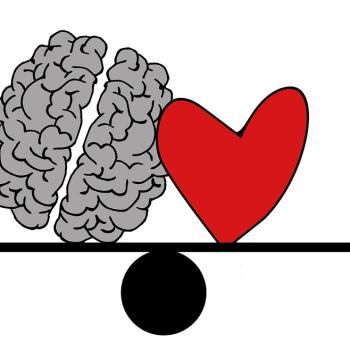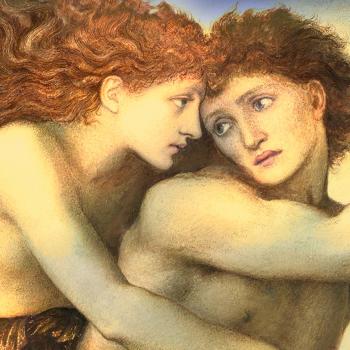“Never Mind – Holding On by Letting Go”

The poet Dante may have said it best for many: “In the middle of the journey of our life, I came upon myself, in a dark wood, where the direct way was lost.” Such darkness may be the gloom of disillusionment, the emptiness of success, or the bitter lessons of a failure. It may be a cloud of undesired memory, long-buried guilt, unfulfilled opportunity, or a disturbing sense of lack—of energy, self-discipline, concentration, or direction. Conscious, deliberate actions become as nothing in the face of an overwhelming helplessness. When it is a lack of faith, it is truly what St. John of the Cross called the “dark night of the soul.”
Life Crises
Whatever it is, the challenges of living finally get our attention if we are lucky. They become their own crises, the moment when we feel so bad we finally have to acknowledge our pain. Wandering about in the dark wood, lost in one’s own labyrinth, each person must seek his own way out, away from the minotaur of anxiety. And each one must, on his own, begin his path from where he is, winding his way through the maze deeper into the darkness before he can emerge into the light of a clearing.
Because the only way out of a dark wood is by going through it.
But the rewards are great, too. The dawn of individual consciousness often follows darkness. Moments of greatest power can occur when things are not going well. “Never are we nearer the light than when the darkness is deepest,” Vivekananda said.
Not surprisingly, in their responses to my request for letters describing sudden changes in awareness, many writers recounted some of the experiences and feelings that reflected this sense of darkness. Here is an excerpt from Sharon, whose life so far had been filled with accomplishments:
And now, I am at another crossroad, and I don’t know which direction
to take. Hence, I am waiting, coming up with ideas, but I am almost paralyzed
in that I can’t bring any of them to fruition. I am at a negative point in my life.
Sharon’s letter, written in her early fifties, indicates a mid-life crisis, typically occurring any time between the ages of thirty-five and sixty. Carl Jung suggested that “we may distinguish between a psychology of the morning of life and a psychology of its afternoon.” He spoke of the patient in the second half of life “who, to understand the meaning of his individual life, must learn to experience his own inner being.” This is the prime task of adult education, he believed, because the psyche is by nature religious. To disregard this nature, especially during the second half of life, he added, leads to neurosis. Jung observed,
Among all my patients in the second half of life—that is to say over
thirty-five—there has not been one whose problem in the last resort was not that
of finding a religious outlook on life. (Jung, Modern Man in Search of a Soul)
Turning Point
The change Jung described is a great turning point in life, from outer to inner consciousness. It marks the end of the partial ego identity and the beginning of the search for the true self, a new psychic birth. Like passing a store window and almost not recognizing our own reflection, we catch a glimpse of ourselves in a new light and are pained by what we see. So wounded, the ego is laid open.
Sometimes a person must go all the way to the furthest extreme and “hit bottom” before there is sufficient creative tension to get back up. The grain of wheat must fall to the ground and die in order to bear fruit. Even longing for death can give way to a rebirth of the self. A recovered alcoholic described his change coming after he had nothing left to lose. Sabrina, too, described such “utter desolation that she was reduced to nothing.”
I was going through a divorce. I was so depressed I was to the point
that I wanted to die, but I knew that I had to live because of my children.
Finally I went to a marriage counselor who gave me the Autobiography of a
Yogi by Yogananda to read. In reading it I felt such peace it was as if I had
finally come back home.
I think I had to first be reduced to nothing, without any will to live,
before I could be ready to accept the teaching of love and faith that I needed.
For Thomas, a priest in his early sixties, the turning point was what he called “a grace filled moment.”
Somewhere. . .in an uneasy state of mind and in constant back pain
and suffering, I wrote a formal letter of resignation and took a long vacation.
. . . . Afterwards, sitting on the plane coming home, feeling so much better, I felt
good about myself, at peace, very reassured. I was puzzled. . . .then I remembered
saying to myself the little sentence of a gospel, “You must come away to some
lonely place all by yourself and rest for a while.” I wasn’t abandoned, I wasn’t
alone. It was all right to do nothing.
As I went through a process of “grace filled moments,” I relived my
journey to helplessness that eventually led me to totally let go of my “fortress
Ego.” I had been so caught up in my importance, my power, my success in life.
When I finally let go, I feel I was allowing the Lord to enter my life and invite me
to “come away to some lonely place all by yourself and rest for a while.” It was
this act of surrender that was my turning to God. Now I am a free man—an exhilarating
feeling—with a joy filled heart.
Perhaps it was Thomas’s constant pain that drove him to his turning point. Suffering, it is said, leads to insight. Sadness makes one empty and open. “The lowest ebb is the turn of the tide,” Longfellow wrote. Any experience which seriously jars complacency, even pain or the process of physically aging, can tear holes in the fabric of egoism. Thomas got “nothing he had asked for, but everything he had hoped for.” What he had feared most had been what he most needed. Spoken or unspoken, prayer has a tremendous power.
Letting Go
Total helplessness, giving up, and extreme resignation are perhaps gifts of grace when obstacles within the mind give way, releasing a new life, a new energy, a new feeling of love, one of the Paradoxes of Prayer. Grace seems to flow from someplace else, like a river of peace. Tibet’s great yogi Milarepa wrote, “A man who is aware finds a friend in desolation and a master in winter. . . .Contemplate all energies without fear or disgust, for that is the stone that turns everything to gold.” In being reborn, we are granted a new life, not by our merit, but by what we don’t do. By letting go of ego, a wall is removed and there is no more struggling.
True letting go comes when we can say “never mind” to our problems in the trust that a Higher Power will support us. Laurie said it was “a matter of faith.” She wrote:
I was so completely enveloped in my problem that I could not see beyond
it. I kept thinking that if I only did this or did that, or if I would really try harder,
everything would be all right. Finally, the situation became so bad that I knew there
was nothing I could do that would help. I had to let go. I just had to trust that fate
or life would solve the problem. It was a matter of faith, but as soon as I let go, all
sorts of wonderful connections started happening.
But when our inclination is to keep trying, the hardest thing in the world is to do nothing, to let go, to empty the mind and rest. We are so used to thinking that what we do is who we are. Even on the spiritual path, self-discipline is necessary. And it is useless to pretend that discipline is not a struggle. “Fusion, inner unity,” Ouspensky said, “is obtained by means of ‘friction,’ by the struggle between ‘yes’ and ‘no’ in man.” Yet at a certain point, one must go beyond and finally relinquish the struggle; only then are we exhausted enough to be empty and receptive.
We need both attitudes. Without the energetic effort of our ego, we would be guilty of the presumption that no effort is necessary. Without prayer and the hope of divine aid, we would be guilty of despair. We must both work as hard as we can and rely on God to help us. The physicist Pauli wrote, “There will always be two attitudes dwelling in the soul of man, and the one will always carry the other already within it, as the seed of its opposite. . . .In allowing the tension of the opposites to persist, we must also recognize that in every endeavor to know or solve, we depend upon factors which are outside our control, and which religious language has always entitled ‘grace.’
Our own power is limited. We can’t entirely control everything. Taoist and Zen philosophies both advise trust in higher powers; the Zen saying is, “Sitting quietly, doing nothing, spring comes, and the grass grows by itself.” The equanimity of inner tranquility and security comes, as William James wrote, “. . . by giving your private convulsive self a rest, and finding that a greater Self is there. . . .[it is] a state of mind, known to religious men, but to no others. . . .”
Perhaps we’re not expected to control everything in our lives, and the darkness comes to make us seek the Source of light. If we can let go and empty ourselves to a higher power, the light will shine, not from us, by through us.












